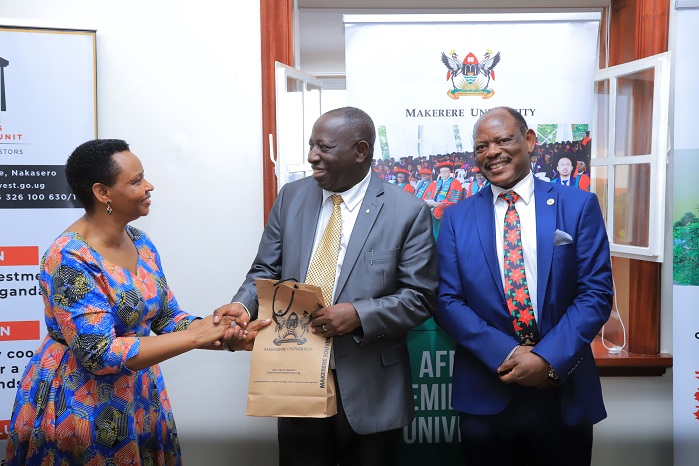
(L-R) Col. Edith Nakalema, Head of State House Investors Protection Unit handing over a present to Prof. Charles Ibingira, Chairman of Makerere University Lung Institute as Prof. Barnabas Nawangwe, Vice Chancellor of Makerere University looks. This was during University Graduates Employment Scholarship Strategies High Level Review Meeting held at Makerere University Ivory Tower on Thursday 21 November 2024. PHOTO BY COLLEB MUGUME
Col. Nakalema handing over gifts to one of the presenters, while Prof. Barnabas Nawangwe the Makerere University Vice-Chancellor looks on
HABARI DAILY I Kampala, Uganda I Graduate unemployment in Uganda remains a pressing issue, with figures reported by various experts as high as 80%.
Data from the Uganda Bureau of Statistics (UBOS), however reveals that the graduate unemployment rate currently stands at 15.2%, calling for action to root it out.
Stephen Asiimwe, the Executive Director of the Private Sector Foundation Uganda (PSFU), said graduate unemployment is a problem that can easily be tackled by the private sector.
“The private sector is positioned to play a critical role to play in fighting graduate unemployment and accelerate job creation. However, the problem of unfavourable business climate should be ironed out,” he said.
Speaking at a high-level meeting held at Makerere University on November 21, 2024, Asiimwe said access to affordable capital remains our biggest issue.

The event brought together academicians, government representatives, and private sector experts to devise actionable solutions to graduate unemployment.
Said Asiimwe: “The government must invest in idea incubation and support startups to ensure they grow into sustainable businesses capable of attracting equity investment,” he said.
He called for reforms in Uganda’s copyright laws to protect creators and their intellectual property. Additionally, Mr. Asiimwe urged the government to explore opportunities for exporting skilled labour, citing Kenya’s success in this area.

A cross section of the participants who attended the event
“The economy is not creating enough jobs. Even the startups we have are failing due to an unfavourable investment climate,” he observed.
Dr. Joseph Muvawala, the Executive Director of the National Planning Authority (NPA), criticised the taxation of new startups, which he argued stifles innovation and growth.
“If we can offer tax holidays and capital support to foreign investors, why not extend the same benefits to our local startups?” Dr. Muvawala questioned.
He also identified skill mismatches as a key driver of unemployment, urging the establishment of graduate employment models and apprenticeship placements to reskill the labour force.
CURRICULUM REFORMS
Academics at the meeting stressed the need for curriculum reforms to align with the job market’s evolving demands.
Prof. Tonny Oyana, Principal of the College of Computing and Information Sciences (CoCIS) at Makerere University, pointed out the absence of training in emerging fields such as artificial intelligence and nanotechnology.
“These are untapped areas with significant market potential that our graduates need to explore,” he said.
Col. Nakalema, the head of the State House Investors Protection Unit (SHIPU), reinforced this sentiment, urging universities to prioritise the development of innovative, market-driven programs and foster knowledge-based industries.
Dr. Vincent Fred Ssenono, the UBOS Deputy Executive Director, attributed the challenge to the increasing number of graduates entering the labour market.

Col. Nakalema speaking during the event
“Unemployment in this context refers to young people between 18 to 30 years who have the skills required to perform a job, actively seek work, but remain without income-generating opportunities,” Dr. Ssenono explained.
Prof. Barnabas Nawangwe the Makerere University Vice-Chancellor expressed optimism about the proposed interventions.
“Comprehensive solutions to tackle graduate unemployment will significantly benefit the country’s economy and development,” he said.
The government plans to establish a one-stop labour market system to streamline job placement processes and ensure employment opportunities are accessible to graduates.




